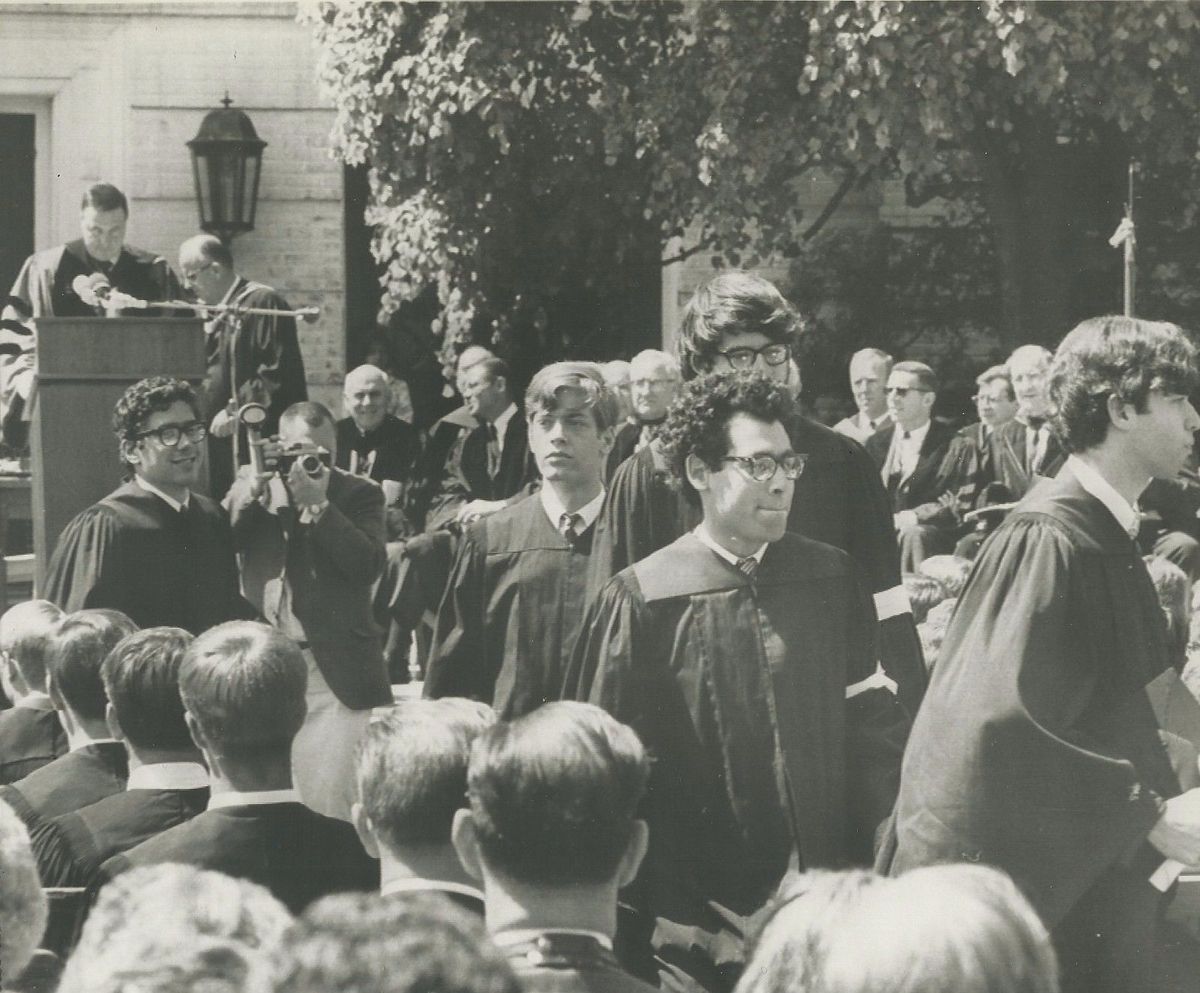From Val to Converse: Amherst Students’ Push for Political Action

Sit-ins and protests are not new to the College. Following the recent dialogue between students, faculty and the administration during the walk-out last week in solidarity with those affected by the Executive Order that targets nationals of Muslim-majority countries, I’ve decided to recover a past instance, about half a century ago, in which students also urged the administration to respond to politics. In the November 2, 1967 issue of The Student, Tim Hardy ’69 covered the Val sit-in to block a U.S. Army recruiter during the Vietnam War:
“Thirty-four Amherst, Smith and University of Massachusetts students blocked the entrance of a U.S. Army Officers’ Candidate School recruiter into Valentine Hall yesterday morning.
“The students, seventeen from Amherst, sat with arms linked in front of the north door of the downstairs lobby of Valentine annex from 9:15 to 10:35 a.m., making it impossible for the recruiter to move into the lobby and set up a display table.
“Assistant Dean of Students Robert Ward, who accompanied recruiter Lt. Richard Plante, confronted the protesting group at the door. When they denied access, he did not attempt to force entry, but did warn the group that they faced possible disciplinary actions. He, however, did not elaborate on what those penalties might be…
“The demonstrators, Dean Ward, other student bystanders and several professors engaged in discussion both outside and in the Valentine entrance for over an hour. Arguments were repeated over and over in normally conversational voices which occasionally became heated exchanges.
“The demonstrators and Ward debated the nature of the Army representative’s visit to campus, Hardy noted in his article, “the question [was] of the College’s complicity with the war effort by allowing the recruiter on campus…”
In the same issue, the Staff published both the demonstrators’ position and the administration’s response:
“The Official Demonstrators’ Position Statement:
To End Complicity
We protest the presence here of job recruiters who wage the Vietnamese War. The College Administration says these recruiters can be here because, they say, any recruiter may come. But by approving their presence, the Administration is supporting the war effort by legitimizing recruitment of more personnel.
“The Administration has taken this action in the name of the entire institution in the name of all the students and faculty.
“However, many members of the college community feel the war is outrageous to legal, moral and other human sensibilities. Yet, even if some disagree with this position, all can agree that the Administration’s action is not representative of the Amherst College community.
“Having these recruiters use our facilities, regardless of its convenience, is complicity with their aims and actions in Vietnam. We call for neutrality, not a complicity in the war which implicates every member of the institution. Neutrality means the school should neither hinder these recruiters off campus nor allow them on campus.
“We call on all students, faculty and administrators of Amherst College to protest the presence of Army Recruiters Wednesday, Nov. 1 from 9 a.m. on, in Valentine Hall.
“The Official Administration Position Statement:
As part of the total program of student counseling at Amherst College, permission is granted from time to time for campus visits by representatives from graduate and professional schools, businesses, industries, military services, government agencies and others. These representatives become the guests of the College, though no endorsement of any such group is thereby implied. They have never failed to conduct their business in a dignified and professional manner. They, and Amherst College, expect that everyone will conduct himself in a similar manner.
“Amherst College recognizes the full range of opinion which exists among its students, faculty and staff, and the College has been specifically concerned that rights of all parties be protected and supported. Various student groups and individuals have traditionally been granted ‘equal time’ to express support or opposition to various organizations by equally peaceful means exhibits, displays, printed literature, etc. Our guests understand and respect this evidence of free speech and dissent. For the guidance of all parties concerned, however, the right of free speech and dissent does not extend to obstruction of the legitimate activities of any visiting group. Neither should the exercise of this right by some be used to inhibit the free access of other students to any visiting individual or group.
“Amherst College assumes that all of its students, faculty and staff share this expectation and appreciate the importance of this policy in assuring that the rights of all members of the community shall be recognized and honored. The college further assumes that all members shall take appropriate steps through their own action to assure that these rights and privileges are not abused by others.”
A few weeks later, an official statement by the college was quoted again as a response to the repercussions of the sit-in, “The College will adopt whatever steps and whatever penalties may become necessary to preserve the freedom of private discourse, the freedom and orderliness of public discussion, and the rights of peaceful, non-coercive protest. It will employ the mildest measures sufficient to those ends…”
And here we are, almost fifty years later, after protests outside of Converse calling for greater representation of black students in 1970, after last year’s Amherst Uprising. Amherst students have consistently shown that they want the administration to do more than recognize politics but to engage in major global events in a way that reflects our values as a community.




Comments ()